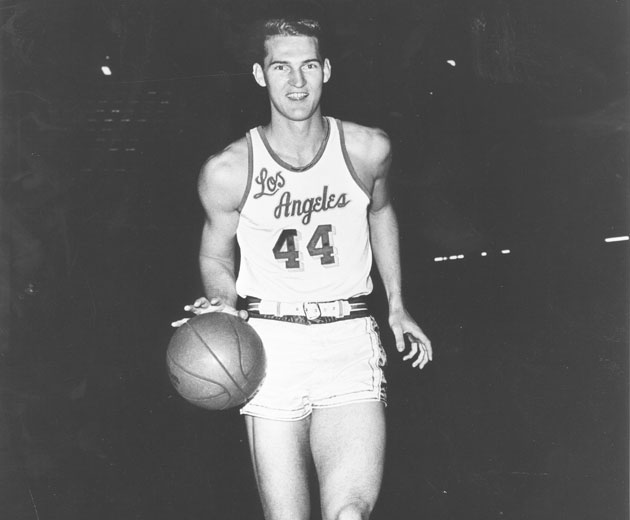
Jerry West turned 75 on Tuesday. The Basketball Hall of Famer, Olympic and NBA champion was a dominant force on several of the NBA’s greatest teams as a member of the Los Angeles Lakers between 1960 and 1974, averaging 27 points and a combined 12.5 rebounds and assists in as a guard hybrid unmatched in NBA history outside of the work of Michael Jordan. His image as a player has famously been used as the NBA’s logo for nearly four decades, and he ranks with Boston’s Red Auerbach as perhaps the NBA’s finest executive in league history, setting up two different dynasties while running the Los Angeles Lakers, before moving on to contribute to playoff teams in Memphis and Golden State.
West is also notoriously hard on himself, both as a player and personnel boss. He remains the only Finals MVP to be plucked from a losing team, taking the honor following a 1969 NBA Finals loss to the Boston Celtics, one of eight Finals losses West’s Lakers had to endure during his run. Unable to wield specific control over the play-to-play action as a coach, he ceded control over the Lakers’ bench to Pat Riley during the 1981-82 season, and even though West was brilliant in anticipating a new era in free agency and salary cap machinations in landing Shaquille O’Neal and Kobe Bryant in 1996, he couldn’t bear to even watch that team’s first moment of championship glory. West decided to take in the Russell Crowe film ‘Gladiator’ at a local cinema instead of sitting through the deciding Game 6 of the 2000 NBA Finals at Staples Center.
This hasn’t let up, even in West’s role as an advisor to the Warriors. NBA.com’s Scott Howard-Cooper recently caught up with the legend to see how he handled Golden State’s first second-round appearance from earlier this month:
"I think the first game we played in San Antonio [in the Western Conference semifinals], I was just sick," he says. "Just sick from watching. I did not sleep one minute the whole night. Not one minute after the game. I was up the whole night."
[…]
Some 1,500 miles away, West's intestines are going through a paper shredder. He goes to bed but can't sleep. He turns on his Kindle, reads two chapters in "Killing Kennedy: The End of Camelot" by Bill O'Reilly and Martin Dugard, and realizes he missed most of the words. So he re-reads the chapters. West replays the missed assignments and careless passes. He watches the clock go from 12:30 a.m. to 6:30 a.m.
For Game 3 against the Spurs, he finally feels up to the trip, an hour flight to Oakland. West still sounds as if he has a very bad cold, but he's typically immaculate in a suit and tie, silver hair combed in place, a commanding presence walking the hallways of Oracle Arena before tipoff. His energy remains boundless, going from conversations with Warriors staffers to fans who want a handshake or autograph.
This is the edge that pulled West out of an impossibly tough childhood in West Virginia. It’s what kept him going when all those championship-caliber Lakers teams fell short in the Finals. It’s what drove him to move all the way to Memphis to help shape a squad that had just moved to Tennessee the season before, and it’s what pushed him into taking on a gig with a laughable Warriors team that was attempting to emerge from the destructive late-career work of Don Nelson.
Perhaps, with the Warriors out of the playoffs and the draft still a month away, Jerry West can find some sort of comfort as he celebrates his 75th. A look at this highlight reel probably wouldn’t hurt the mood:
Happy birthday, Mr. Clutch.
No comments:
Post a Comment